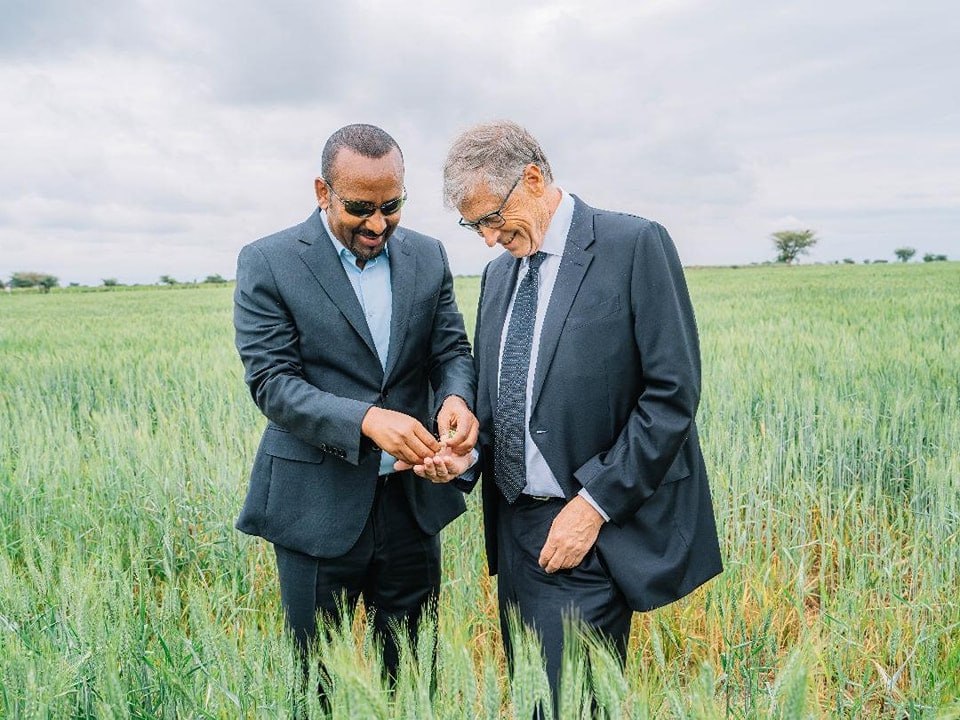Words of Bill Gates on Ethiopia’s Transformation - ENA English
Words of Bill Gates on Ethiopia’s Transformation

Bill Gates, the billionaire founder and former CEO of Microsoft, had visited Ethiopia in the first days of September, 2024. Accompanied by Ethiopia’s Prime Minister Abiy Ahmed, Gates toured some of the country's expansive wheat fields, which Ethiopia had never before been known for. The lush green expanse of wheat stretched as far as the eye could see.
He was amazed by his visit to the country as he has observed a remarkable transformation that changed the face of Ethiopia 40 years ago. He quoted Prime Minister Abiy Ahmed as saying “…the prime minister spoke with particular pride about one big accomplishment: Ethiopia no longer needs to import any wheat. It grows all its own.”
“The farm cluster we visited is a great example of how they’re doing it. Three years ago, the fields there weren’t farmed at all. Today, nearly 2,400 farmers there are working almost 100,000 acres of wheat, and they’re using innovative approaches to get the most out of the land. As a result of these reforms across the country, the average Ethiopian farmer now gets 70 percent more wheat per hectare than they did 15 years ago—a fantastic accomplishment that the foundation has been proud to support,” Gates elaborated.
This is the reality what the world is observing about the current Ethiopia. However, a new version of the 1980s Band Aid's Do They Know It's Christmas? is recently released defying the existing encouraging situations in Ethiopia.
Prime Minister Abiy has lambasted the 40th anniversary re-release of the charity single Do They Know It’s Christmas?, calling it reductionist and dehumanizing. Abiy stated modernization of the agricultural sector and other development endevours in the country indicate that future droughts won’t be so catastrophic. While acknowledging the well-meaning intentions behind the original Band Aid initiative, Abiy pointed out that Ethiopia has undergone substantial transformation since the 1980s.
He argued that the song, which perpetuates images of a famine-stricken Ethiopia, fails to reflect the nation's rich history, culture, and significant progress. Ethiopia is now one of Africa’s fastest-growing economies, with notable advancements in agriculture and self-sufficiency.
Over the past five years Ethiopia has introduced a new venture of tackling under development with a view to securing food sovereignty and new development culture. The agriculture sector which was based on rain fed farming has now developed into irrigation farming and cluster farming mechanisms. As the result of agricultural reform programs carried out over the past five years, the country has become the top wheat producing country in Africa and has stopped importing wheat from overseas.
Through the ‘Bounty of the Basket’ agricultural program initiated by Prime Minister Abiy, the production of milk, chicken and apiary has been drastically increasing expanding family meal basket. Chicken meat development that was 70,000 tons has now grown to 208,000 tons while milk production has grown from 7.2 billion to 10 billion liters. Honey production had increased from 128,000 tons to 272,000 tons.
The Green Legacy initiative launched in 2019 in order to mitigate the impacts of climate change, enhance agricultural productivity and ensure food security is bearing fruits as the green carpet that was drastically degraded is now coming back again. Ethiopia is currently transforming from forest depletion to massive coverage of green area due to the trees planed over the past six years. The country has managed to plant more than 40 billion trees across the country since 2019. The country is attracting the global community for its tourism attractions and foreign direct investment.
A recent report by Voronoi, based on 2024 data from the International Monetary Fund (IMF), listed Ethiopia as one of the five Africa's largest economies. This figure represents a significant portion of Africa’s overall GDP, which stands at 2.8 trillion USD. According to the report Ethiopia’s GDP figures has reached 205.13 billion USD.
Now, famine does not define Ethiopia. This Ethiopia is extremely different from the 1980s. The overall Ethiopia's economy is currently soaring propelling it to the top in East Africa and third in sub-Saharan Africa. The country is also engaged in industrial productivity to substitute imported food items. Edible oil, spaghetti and fortified foods are some of these items being produced domestically.